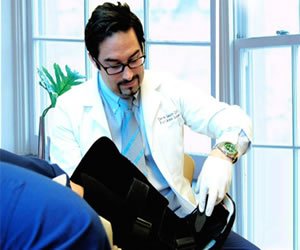At this past year’s UC Davis Pre-Health Conference, Stanford Health Care’s Chief of Staff, Dr. Mark Welton headlined three popular sessions. His talks centered on what a chief of staff is, how you get to be chief of staff, and what we need to do to maintain health care costs.
No one would have guessed that back in the 1970’s, on this same campus, the distinguished physician and leader was told he’d never make it through UC Davis’s pre-med program, let alone get into medical school.
“I struggled through some of the classes,” Walton, who is also the Chief of Colon and Rectal Surgery, admits. Lucky for the medical profession, he not only managed to make it through pre-med, but successfully finished medical school at UCLA and completed a fellowship in colon and rectal surgery at Washington University. After teaching at University of California, San Francisco for 8 years, Walton transitioned to Stanford in 2001 and has been there ever since.
students
Strategies for Success on Retaking the MCAT
Retaking the MCAT requires a different approach to prep than your first time around. Because … Read more
Refuse To Take No For An Answer: How I Got Into Dental School After 6 Tries
By Travis Barr, DDS
This article is reprinted with permission from the American Student Dental Association. It originally appeared in December 2014 issue of ASDA News.

For me, the road to dentistry has been more like a grueling endurance race. The ride consisted of three DAT tests, 19 drafts of personal essays and six application cycles in a row—not to mention three-and-a-half years of chair-side experience as a dental assistant, umpteen semesters of graduate courses and some intensive on-the-job training in the roles of husband and father.
I was not what you’d call an ideal candidate. I started college on a football scholarship as a defensive end in Peru, Nebraska, and I was more concerned with making weight, winning games and having a good time than I was with books and grades. Even after I transferred to the University of Northern Colorado, it wasn’t until my junior year that I started thinking seriously about my future and my academic performance. By the time I graduated the following year, I was proud of how far I’d come. I’d turned my performance around, raising my GPA from 2.0 to 3.2 and earning a biochemistry degree while holding down a full-time job and a tutoring position on campus. I had met the girl of my dreams, and I had set my sights on what seemed to be a perfect career for me: dentistry.
Thriving in School? Integrating Stress Intervention Practices
Mark Twain “The physician who knows only medicine, knows not even medicine.”
Ahhh, spring! A time to shake off winter cobwebs and cabin fever, a season for rejuvenation, long walks in the park, hooking up with friends and family, falling in love, etc. Well, this may be so for “normal” folks, but not for those poor souls who have voluntarily submitted themselves to the unimaginable workload of medical school or pre-health education! Spring for many students just means more seemingly unending psychological and physiological stress. Things such as MCAT, USMLE, COMLEX, DAT, PCAT and, yes, those pesky applications and letters of recommendations around the corner at the end of spring are all things student can look forward to (not to intentionally add more stress). Medical and pre-health students know from experience that this relentless stress can and often does wreak havoc on their body, mind and spirit. It does not come as a surprise that these experiences can result in anxiety disorders, chronic fatigue, depression, and immune deficiency. Students suffer from perpetual fight or flight sensations, as if being chased by a tiger, symptoms which escalate around exams, applications, or interviews.
Medical School Reapplication: The Perspective of a Reapplicant
I am a reapplicant. Those are four words that every reapplicant shies away from and … Read more
Plan to Make the Most of Your Summer—Now
Summer is a great time to get medically related experience, which can be an important … Read more
Marriage in Medical School: A Memoir (So Far)
During my senior year of college, I asked my girlfriend to marry me. We had been together for almost three years and planned to get married the following summer, since we were both graduating in the spring. The timing seemed perfect to start our new life together. There was just one minor problem: in the fall, I was planning to begin medical school.
While engaged, we dealt with a mixture of apprehension and excitement about marriage. The typical questions asked by engaged couples–questions like, “Where will we live? What will our source of income be? How will we make time to see family? How will our relationship change?”–were the same questions we asked, except with the additional uncertainty of medical school. We had learned how to juggle our relationship with the demands of college, but we were unsure about how it would change while I dealt with the great challenge of medical school. (Neither of us were oblivious to the “horror stories” surrounding medical school and its required time commitment).
Stepping Into the Medical Field and Out of Your Comfort Zone
Are you ready to become a doctor? Making the transition from undergraduate to medical school student, and on to being a full time doctor can be exciting and intimidating at the same time. There are many challenges and obstacles you may face along your journey, but what is most important is that you face them with confidence. Read on for tips on how to make stepping outside your comfort zone a little more comfortable.
Build Strong Relationships With Your Professors
Start out in the classroom. When you are still studying, whether you are an undergraduate or already in medical school, classes should be much more than simply showing up and doing the work. Take time to get to know your professors, if the size of your university/class allows. They have vast amounts of knowledge and experience, and most likely they are more than happy to share that with you!
6 Ways to Be Productive While Studying
Life as a med student is a blur of tests and clinicals with many nights … Read more
Budgeting in Medical School: Does It Really Matter?
Medical students deal with a lot of scary things: frequent do-or-die exams, looming USMLE or … Read more
Top 5 Reasons Applications Get Rejected
In 2013, roughly half of all medical school applicants did not receive an acceptance letter. … Read more
The 10 Lessons Every Pre-Med Must Learn
The premed journey is different for everyone. For some, it’s really not that much of … Read more
20 Questions: Devon Glazer, DPM, FACFAS, FAAFAS
Devon Glazer, DPM, Fellow of the American College of Foot and Ankle Surgeons (FACFAS) and … Read more
Seven Habits of Highly Effective Clinical Students
Republished with permission from here. Congratulations! You’ve made it to the clinical portion of medical … Read more
Leveraging Pre-Med Learning Experiences for Success
Pre-medical students can – and should – take advantage of the many opportunities available to … Read more
Six Ways for Applicants to Find a Happy Medium with Social Media
Updated September 30, 2021. The article was updated to correct minor grammatical errors and to … Read more
An Introvert’s Survival Guide: How to function (and flourish) in medical school as an introvert
“Knowing yourself is the beginning of all wisdom.” – Aristotle Even at the time, I … Read more
5 Golden Nuggets of Advice From a 3rd Year Dental Student
This article is reprinted with permission from the American Student Dental Association. It originally appeared on ASDA’s blog, Mouthing Off.

School is back in session! You know what that means? Another year of late night studying, junk food binges, red-eye lab sessions and caffeine runs to Starbucks. Each year of dental school presents its own challenges, and it never gets easier. But that doesn’t mean you should be discouraged or stressed over it. Just starting my D3 year, I do not consider myself to be a seasoned dental student. However, I do feel there are a few nuggets of wisdom I’ve acquired over the past two years of dental school that are worth sharing. They have proven to be of benefit not only to me, but also to a majority of my classmates. Here are Jay’s keys to success in dental school:
What Can You Learn From Reflecting on Your MCAT Test Day Experience?
The MCAT is a significant hurdle that all students who wish to attend medical school must overcome. However, even after you have successfully completed the exam, you can continue to learn from your testing experience by reflecting on the test day itself.
Below are four areas of reflection that can provide you with additional insight about your future as a physician. Do not neglect to consider them!
1. How you learn best
Many students experiment with a variety of study and test-taking strategies when preparing for the MCAT. After identifying which methods are most successful, they ultimately settle on a framework that works best for them. Throughout this process, you will likely discover how you study most efficiently and most effectively, which is an invaluable tool as you move forward to medical school.
Self-Care in Medical School: A Lesson from the Heart
As a first-year medical student only a few weeks into gross anatomy, I still have … Read more




















